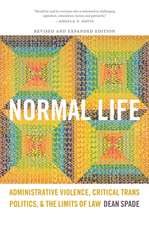Black Dogs and Blue Words: Depression and Gender in the Age of Self-Care
Autor Professor Kimberly K. Emmonsen Limba Engleză Paperback – 30 sep 2014
His "black dog"--that was how Winston Churchill referred to his own depression. Today, individuals with feelings of sadness and irritability are encouraged to "talk to your doctor." These have become buzz words in the aggressive promotion of wonder-drug cures since 1997, when the Food and Drug Administration changed its guidelines for the marketing of prescription pharmaceuticals.
Black Dogs and Blue Words analyzes the rhetoric surrounding depression. Kimberly K. Emmons maintains that the techniques and language of depression marketing strategies--vague words such as "worry," "irritability," and "loss of interest"--target women and young girls and encourage self-diagnosis and self-medication. Further, depression narratives and other texts encode a series of gendered messages about health and illness.
As depression and other forms of mental illness move from the medical-professional sphere into that of the consumer-public, the boundary at which distress becomes disease grows ever more encompassing, the need for remediation and treatment increasingly warranted. Black Dogs and Blue Words demonstrates the need for rhetorical reading strategies as one response to these expanding and gendered illness definitions.
Black Dogs and Blue Words analyzes the rhetoric surrounding depression. Kimberly K. Emmons maintains that the techniques and language of depression marketing strategies--vague words such as "worry," "irritability," and "loss of interest"--target women and young girls and encourage self-diagnosis and self-medication. Further, depression narratives and other texts encode a series of gendered messages about health and illness.
As depression and other forms of mental illness move from the medical-professional sphere into that of the consumer-public, the boundary at which distress becomes disease grows ever more encompassing, the need for remediation and treatment increasingly warranted. Black Dogs and Blue Words demonstrates the need for rhetorical reading strategies as one response to these expanding and gendered illness definitions.
Preț: 307.48 lei
Nou
Puncte Express: 461
Preț estimativ în valută:
58.84€ • 62.92$ • 49.06£
58.84€ • 62.92$ • 49.06£
Carte tipărită la comandă
Livrare economică 17 aprilie-01 mai
Preluare comenzi: 021 569.72.76
Specificații
ISBN-13: 9780813571423
ISBN-10: 0813571421
Pagini: 230
Ilustrații: 11 illustrations, 9 tables
Dimensiuni: 152 x 229 x 15 mm
Greutate: 0.36 kg
Ediția:First Paperback Edition
Editura: Rutgers University Press
Colecția Rutgers University Press
ISBN-10: 0813571421
Pagini: 230
Ilustrații: 11 illustrations, 9 tables
Dimensiuni: 152 x 229 x 15 mm
Greutate: 0.36 kg
Ediția:First Paperback Edition
Editura: Rutgers University Press
Colecția Rutgers University Press
Notă biografică
KIMBERLY K. EMMONS is an associate professor of English and director of composition at Case Western Reserve University. She has contributed to medical rhetoric collections and writing journals.
Cuprins
Introduction: Depression and Gender in the Age of Self-Care
1 Depression, a Rhetorical Illness
2 Articulate Depression
3 Strategic Imprecision and the Self-Doctoring Drive
4 Isolating Words
5 Telling Stories of Depression
6 Diagnostic Genres and the Reconfiguring of Medical Expertise
Conclusion: Toward a Rhetorical Care of the Self
1 Depression, a Rhetorical Illness
2 Articulate Depression
3 Strategic Imprecision and the Self-Doctoring Drive
4 Isolating Words
5 Telling Stories of Depression
6 Diagnostic Genres and the Reconfiguring of Medical Expertise
Conclusion: Toward a Rhetorical Care of the Self
Recenzii
"Black Dogs and Blue Words is written in an accessible, clear style that will appeal to both experts and non-experts alike. In the field of rhetoric, this book is a major addition that aims to open up the gendered behaviors of depression in person/patient care. Emmons's text crosses disciplines in a way that is comprehensible to a wide audience."
"Emmons' book offers a useful and illuminating contribution to the study of depression that will be of interest to sociologists."
"Emmons writes insightfully about depression's gendered quality and the popular inclination to 'self-doctoring.' With her notion of 'rhetorical care of the self,' she offers a novel way of responding to the experience known as depression."
"In Black Dogs and Blue Words, Kimberly Emmons beautifully articulates how depression is a nuanced form of communication that calls upon a host of cultural metaphors, tropes, stories, and genres. Brilliantly argued and clearly written, this book pushes understandings of mental illness and its discontents into exciting new terrain. It is required reading for anyone interested in understanding our minds, our selves, and the ways we communicate with others."
Descriere
Black Dogs and Blue Words analyzes the rhetoric surrounding depression. Kimberly K. Emmons maintains that the techniques and language of depression marketing strategies--vague words such as "worry," "irritability," and "loss of interest"--target women and young girls and encourage self-diagnosis and self-medication. Further, depression narratives and other texts encode a series of gendered messages about health and illness.
As depression and other forms of mental illness move from the medical-professional sphere into that of the consumer-public, the boundary at which distress becomes disease grows ever more encompassing, the need for remediation and treatment increasingly warranted. Black Dogs and Blue Words demonstrates the need for rhetorical reading strategies as one response to these expanding and gendered illness definitions.
As depression and other forms of mental illness move from the medical-professional sphere into that of the consumer-public, the boundary at which distress becomes disease grows ever more encompassing, the need for remediation and treatment increasingly warranted. Black Dogs and Blue Words demonstrates the need for rhetorical reading strategies as one response to these expanding and gendered illness definitions.














